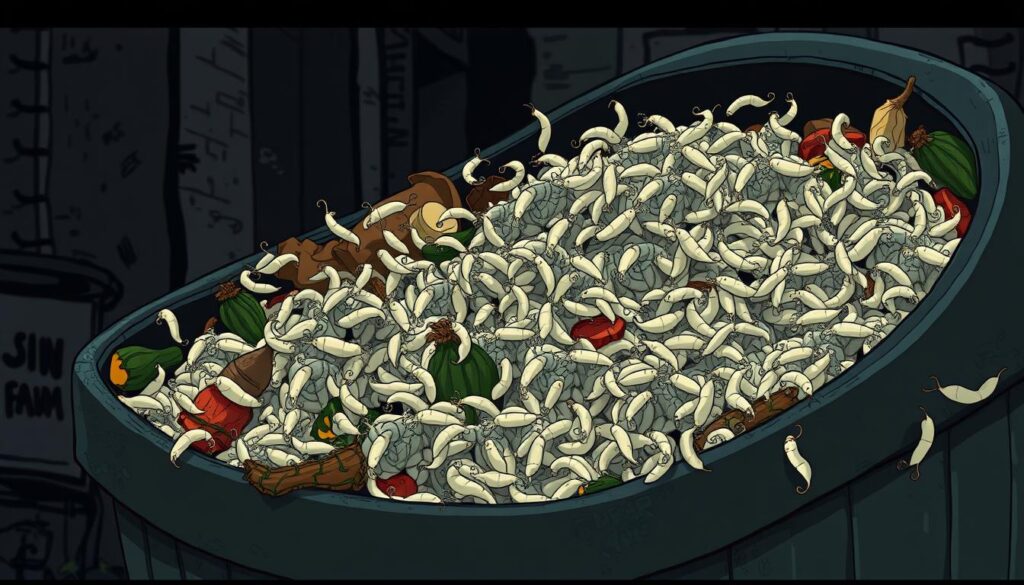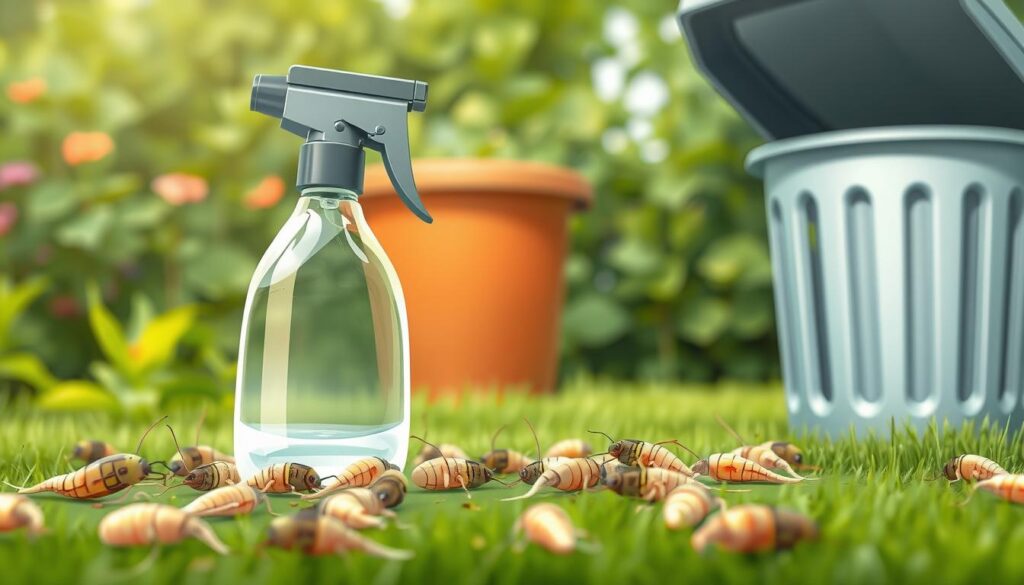I’ve been in the bin cleaning business for over 20 years. Since 2002, we’ve cleaned over 1 million bins. We serve thousands of happy customers every year. Maggots are fly larvae that love warm, moist places with organic matter.
They can hatch in just 24 hours and live for 5-6 days before turning into pupae. To stop maggots, you need good waste management and clean bins. This guide will show you how to keep your bin maggot-free and clean.
Key Takeaways
- Maggots are fly larvae that can hatch within 24 hours and live for 5-6 days before pupating.
- Proper waste management and bin hygiene are crucial to prevent maggot infestations.
- Understanding the lifecycle of maggots can help you implement effective prevention techniques.
- Stopping maggots from climbing out of the bin is essential to maintain a clean, pest-free environment.
- This guide provides practical solutions to address maggot problems in your bin.
Understanding the Lifespan of Maggots
Maggots are the larval stage of flies and have a short but efficient life cycle. Female flies can lay up to 500 eggs, which hatch into maggots. These maggots are cream or light brown with a dark mark for breathing.
They feed on rotting fruit, waste, and organic matter for 14 to 36 days. After that, they turn into pupae and eventually become adult flies.
Life Cycle of a Fly
The life cycle of a fly starts with the female laying eggs in organic matter. The eggs hatch into maggots, which feed and grow for 14 to 36 days. Then, they pupate into adult flies.
House flies, for example, live for 15 to 30 days. In this time, they can spread over 100 different pathogens, making them a big pest control issue.
Conditions That Encourage Infestation
Maggots love warm, humid places with lots of organic waste. Fly infestations happen where food residue, moisture, and bad waste management are common. Knowing how maggots live and what they need helps with fly control and pest control.
“Prevention is crucial as flies have a fast life cycle, causing infestations to occur rapidly.”
Causes of Maggot Infestations
Maggot infestations often start because of bad waste management. This includes having food residue and moisture in bins. Even one fly can lay eggs in a bin, causing an infestation. Kids who are picky eaters can make more food waste, which increases the chance of maggots.
Improper Waste Management
Warm weather makes waste decompose faster, attracting more flies. Keeping bins sealed, covering food scraps, and managing waste well can lower maggot risks. [https://www.warwickdc.gov.uk/info/20478/refuse_collection/596/advice_on_maggots] Regular cleaning and good hygiene can also help stop maggots.
Food Residue and Moisture
Maggots love rotting fruit and waste and feed for about five days before turning into flies. Having food residue and moisture in bins is perfect for maggots to grow. Sealing your wheelie bin and making sure food scraps are covered can stop maggots.
| Statistic | Value |
|---|---|
| Maggot Lifespan | 15 to 30 days |
| Fly Gestation Period | Mostly exist as larvae (maggots) |
| Maggot Feeding Duration | Around 5 days before becoming flies |

Good waste management and keeping things clean are key to avoiding maggot problems. Sealing bins, covering food waste, and regular cleaning can greatly reduce maggot risks.
Prevention Techniques for Your Bin
Keeping your bin clean and well-managed is key to stopping maggot infestations. As experts in waste management, we know that being proactive helps a lot. It keeps your bin free from these pests.
Use of Bin Liners
Bin liners are your first defence against maggots. They help keep waste in and make cleaning easy. Make sure to clean up spills or leaks fast. This stops flies and their larvae from coming.
Keeping the Bin Area Clean
Cleanliness is crucial in stopping maggots. Clean and disinfect your bin and the area around it often. This removes food sources and keeps flies away. A clean bin area keeps pests off.
Sealing Food Waste Properly
Properly disposing of food waste stops maggots. Wrap food, pet waste, or nappies well before putting them in the bin. Squeeze out air and tie bags tight to keep smells in. Rinsing food packaging also helps keep flies away.
Using these prevention methods helps keep your bin area maggot-free. A clean and well-managed bin is the first step to keeping pests away.
| Technique | Benefits |
|---|---|
| Use of Bin Liners | Contain waste, make cleaning easier, reduce odours |
| Keeping the Bin Area Clean | Eliminate food sources, deter fly attraction |
| Sealing Food Waste Properly | Contain odours, prevent accessibility for flies |
“A clean and well-managed bin is the foundation for keeping maggots at bay.”
Chemical Solutions to Control Maggots
Chemical solutions can be a good choice for dealing with maggots. Insecticides and pest control products target fly larvae. It’s important to pick the right one and follow safety guidelines.
Choosing the Right Insecticide
Look for insecticides with permethrin, cypermethrin, or deltamethrin. These are effective against fly larvae. Brands like Rentokil offer solutions, like the Mini Fly Box, to kill flies before they lay eggs.
Safety Tips for Application
- Always read and follow the manufacturer’s instructions carefully, paying close attention to the recommended dosage and application methods.
- Wear appropriate personal protective equipment, such as gloves and a mask, when handling and applying the insecticide.
- Avoid spraying insecticides directly on food waste or in areas where food is prepared or consumed.
- Consider using insecticide strips or traps inside the bin to control flies and prevent future infestations.
- Combine chemical solutions with proper waste management practices, such as regular bin cleaning and sealing food waste, for lasting results.
Chemical solutions can help control maggots, but use them responsibly. They should be part of a broader plan to keep pests away. If you’re unsure, get professional advice.

Natural Remedies for Maggot Problems
Maggot infestations can be a real problem. But, there are some natural ways to tackle them without harsh chemicals. Vinegar is a simple and effective solution. Mix equal parts vinegar and water and pour it on the affected area. This kills maggots and stops flies from laying eggs.
Using Vinegar as a Deterrent
Vinegar’s acidity makes it hard for maggots to survive. The strong smell also keeps female flies away. Spraying vinegar around bins and problem spots helps keep maggots away.
Essential Oils that Repel Flies
Citronella, lemongrass, and peppermint essential oils repel flies. A few drops in your bin or around the area can keep flies away. You can also use cotton balls soaked in these oils in problem spots.
For big maggot problems, boiling water can be a quick fix. The heat kills maggots instantly. Sprinkling salt on food sources also works, as maggots can’t handle drying out.
While natural remedies work for small problems, bigger infestations might need professional help. The important thing is to act fast and keep up the effort to stay maggot-free.
Tips for Cleaning a Maggot-Infested Bin
When you find maggots in your bin, cleaning it right is key. First, get rid of any waste that’s been affected. Put the bin liner or bag in a strong, sealed container for throwing away.
Safe Disposal of Contaminated Waste
Don’t touch the waste with maggots in it. Wear gloves and throw the sealed bag away safely. Follow the rules for waste in your area to stop maggots and germs from spreading.
Deep Cleaning Procedures
After getting rid of the bad waste, clean the bin well. Use hot water, soap, and a disinfectant to clean inside and out. Bleach works well, but be careful and make sure there’s good air flow. Let the bin dry in the sun if you can, as sunlight kills pests.
If smells linger, try using coffee grounds or special odour removers. If cleaning is hard, get a pro to make sure it’s really clean and smells good.
Keeping your bin clean regularly stops maggots from coming back. By following these steps, you can keep your bin clean and free from pests. This helps keep your area healthy and pest-free.
Dealing with Maggots in Other Areas
Maggots can be a problem in places other than your bin. They can also infest garden waste and kitchen composting bins. But, you can manage and prevent them with the right steps.
Garden Waste Bins
Garden waste bins are often hit by maggots. This is because they have organic materials that attract flies and their larvae. To avoid maggots, make sure to manage green waste well and seal the bin when not in use. Regular cleaning and upkeep can also keep maggots away.
Kitchen and Composting Bins
Kitchen and composting bins are also at risk of maggots. This is because they have food waste. To stop maggots, use tight lids on kitchen bins and think about using compostable liners. Also, keep your compost bin balanced to prevent fly breeding and maggots.
For any bin, cleaning regularly and managing waste properly is key. These steps help keep maggots away. So, you can enjoy a maggot-free home and garden.
| Area | Recommended Approach |
|---|---|
| Garden Waste Bins |
|
| Kitchen and Composting Bins |
|
By using these strategies, you can tackle maggots in your garden, kitchen, and composting bins. This will make your outdoor and indoor spaces cleaner and more pleasant.
When to Seek Professional Help
Many maggot problems can be solved at home. But, big infestations need a pro’s help. Look for signs like lots of maggots, issues that won’t go away, or problems spreading everywhere. It’s time to call a pest control service then.
Signs of Extensive Infestation
Seeing lots of maggots, even after trying home fixes, means it’s too big for you. Also, if maggots start showing up in other places, like your garden bin or kitchen compost, it’s a clear sign you need a pro.
Contacting Pest Control Services
Pest control experts have strong treatments and can find the problem’s source. The British Pest Control Association (BPCA) website helps find trusted, audited, and insured pest control companies near you. They’ll inspect, plan a solution, and fix the problem safely and well.
If you can’t stop the maggots, don’t wait. Professionals have the skills and tools to quickly solve the problem. They’ll stop it from getting worse and causing more trouble.
Maintaining a Maggot-Free Environment
Having a good waste management plan and teaching others how to prevent maggot problems is key. Regularly getting rid of waste, especially when it’s warm, helps a lot. This can stop flies and maggot issues.
Regular Waste Disposal Schedule
Try switching the food waste between green and grey bins more often in summer. This keeps organic waste down, which flies and maggots love. Also, make sure bins are in the shade and lids are shut tight to keep flies away.
Educating Household Members on Prevention
It’s important for everyone in the house to know how to manage waste well. Teach them to wrap food, rinse recyclables, and keep bins clean. Check bins often for signs of pests and fix any problems quickly. By doing these things regularly, you can keep your home free from maggots and stay clean.
